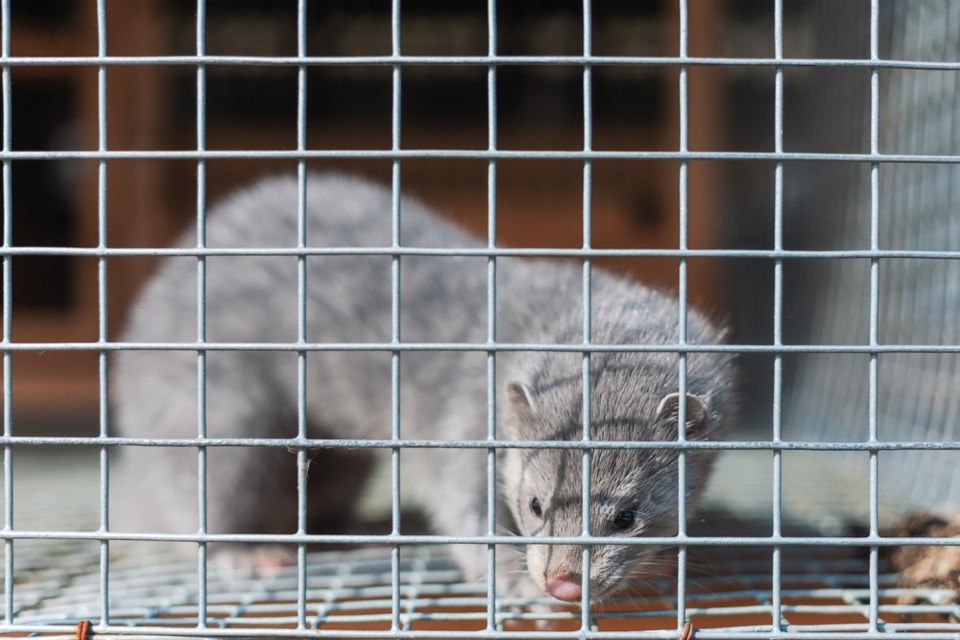B.C. is set to phase out mink farms, citing concerns the virus that causes COVID-19 could mutate in the creatures and spread back to the human population.
To date, three of the nine mink farms across the province have faced outbreaks among animals and farm workers. In July, that led the provincial government to place a moratorium on any new mink farms and cap the expansion of the animals on the farms.
On Friday (Nov. 5), it took one step further and moved to phase out the industry by 2025.
"This decision follows the recommendations of public health officials and infectious disease experts about managing the threat of the virus for workers at the farms and the broader public," said B.C. Agriculture, Food and Fisheries Minister Lana Popham.
BC Mink Producers Association president Joseph Williams told Glacier Media he and the rest of the industry were told their mink farms would be phased out an hour before the province announced the decision.
“Obviously, this is very emotional for us,” he said. “Our livelihoods have just been taken away.”
Williams says his farm in Langley, Williams Fur Farming Ltd., has been in the family since 1991. Today, he runs it with five other family members. Together, Williams, along with the other eight mink farms in the province are now organizing to figure out how they will respond.
“We don’t accept it and we’re looking into what we can do,” he said. “This isn’t based off science. This is an anti-fur agenda.”
B.C. officials denied that their decision had anything to do with animal rights. Provincial health officer Dr. Bonnie Henry said data from the BC Centre for Disease Control led to concerns the animals would act as a reservoir for the SAR-CoV-2 virus to mutate.
Henry said public health officials have not seen a variant of concern arise in the B.C. mink population, but other viruses have been documented to pass from the animals into humans in other countries.
Last year, both Dutch and Danish authorities culled their countries’ entire farmed mink populations after SAR-CoV-2 was found to have mutated, passing from the animals to humans.
Since then, there has been a wider push in several countries, including the United States, to ban mink farming.
"Some of those viruses that spread to humans were variants of concern," said Jan Hajek, an infectious disease specialist at Â鶹´«Ã½Ó³»General Hospital and clinical assistant professor of medicine at UBC.
"It wasn’t such a terrible mutation, but the idea was this could happen."
Mink isn’t the only non-human species that can catch COVID-19. Ferrets and cats — including several tigers and lions at a zoo in New York City — have tested positive; mink, however, present a greater risk to human health, said Henry.
"The really important factor is the numbers you have in the small space together," she said. "When this virus gets into a population and spreads, replicates in large numbers, that’s when mutations arise."
Those mutations can give an advantage to a virus, as seen with the Delta variant when an explosion of transmission in India allowed the virus to mutate in the human population.
Public health officials say they’re worried the Delta variant could get passed back and forth between the mink population and even vaccinated people.
Another concern, said Henry, is that the government has found escaped mink on and close to farms, raising concerns they would pass it to wild species like deer or even cats and dogs.
Throughout the pandemic, Henry said staff from public health, WorkSafeBC and the Ministry of Agriculture have been faced with an "intense amount of work" to inspect, test and ensure biosecurity measures are in place on mink farms.
B.C.’s nine mink farms are home to roughly 318,000 mink and provide jobs to about 200 workers. That includes families that work their own farms and temporary foreign workers employed on a seasonal basis.
Minister Popham said the decision to eliminate mink farming in the province had nothing to do with ongoing calls from animal rights advocates to ban the practice.
She said farms will have access to insurance programs and the government will help them to transition to other industries with support provided through its .
Because the mink industry usually kills the animals near the end of the year, both Henry and Popham said mink farmers will be able to sell pelts from all the existing animals.
The province says it will place a permanent ban on live mink farming by April 2023, with all operations ceasing by 2025. Popham could not provide a number on how much the phase-out would cost.
"We don’t know what [farm owners] are going to want to do with their future, but we’re going to be there along the way," she said.
Henry added that some mink used for breeding can be kept until 2023, but that they must be sold out of province. That provision has infectious disease expert Hajek concerned.
"I’d worry they’d just transition to Alberta or move," he said, noting the spread of COVID-19 does not respect provincial or international borders.
The BC SPCA has called for a ban on mink farms in the province for some time. Despite the province pinning the decision on public health, animal rights activists are hailing the move as a victory.
"I’m ecstatic," said animal rights lawyer Victoria Shroff. "There’s been pressure on the government to question the industry… This industry has no place in society anymore.
"I think it’s something we need to follow through for all fur farming in Canada."


